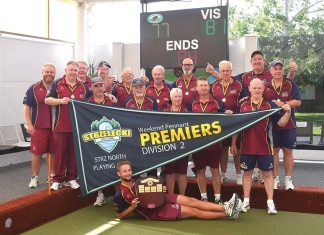By ZAIDA GLIBANOVIC
WHEN Andrew Matthews from Traralgon learnt about the state levy on electric vehicles (EVs), he thought it was “a bit ridiculous”.
But after a landmark High Court case, Mr Matthews and his wife will no longer have to pay the state government-enforced tax on their zero-emission cars.
Aware of the state-issued charge but not its 2.8 cents increase per kilometre, Mr Matthews paid his tax bill for his Tesla Model 3 just a few months before the court’s ruling was handed out in October.
Mr Matthews said he understood the need to tax energy consumption for EVs like gas prices, but found the kilometre-based tax for Victoria unreasonable.
“I always thought the Victorian tax was a bit ridiculous in that you’re getting taxed for kilometres travelled in and outside your state, and how that would be practical for road users really didn’t make sense to me,” he said.
Paying close attention to the recent High Court decision scrapping the electronic vehicle tax, Mr Matthews said incentivising zero-emission cars would be a better approach from the government.
“I think the incentives of the space is somewhat important given the current cost of the vehicles,” he said.
With a growing presence of electronic vehicle owners in the region, Mr Matthews has seen the increase first-hand.
“It was somewhat rare to see EVs on the road in Valley, late last year… my wife would say that every other day she would see one in Traralgon,” he said.
As a result of the High Court’s decision, customers who previously complied with the requirements of the Zero Low Emission Vehicles (ZLEM) scheme and made payments of the road-user charge are eligible for a full refund.
VicRoads have said that light motor vehicles classified as ZLEV are eligible for a registration discount of up to $100 per year (pro-rata for registration periods of less than 12 months).
Because conventional hybrids (such as Toyota Camry Hybrid) are not classified as ZLEVs, the $100 registration discount will not apply.
The tax proposed by the state government would have been at over two cents per kilometre to match the contributions of fuel-powered vehicles for road maintenance under the Commonwealth fuel excise.
Regular automobile owners now pay gasoline taxes of $1200 per household per year, while electric car owners can now relax.
Electric vehicle owners Chris Vanderstock and Kath Davies led the charge and launched the lawsuit on what the pair called the “world’s worst EV policy”.
Motorists were required under the policy to document their vehicle odometer to VicRoads to be charged on their usage each year with penalties if they didn’t comply.
The High Court’s landmark decision found the tax was an excise, a goods tax only to be imposed by the Commonwealth.
VicRoads posted to its website saying, “The Government is reviewing the High Court’s decision to understand its implications and how the ruling will be implemented.
“Motorists who are due to renew their zero and low emission vehicle (ZLEV) registration should continue to do so.
“We are in the process of contacting all ZLEV customers directly to explain what the decision means for them and any next steps.”
The four-to-three ruling divided the court and can be seen as setting precedence for other state levies, including mining, luxury vehicles and livestock sales.
The decisions could come as a win for the region, which is working to create a rapid charger network across the Latrobe Valley and into Gippsland.
Victoria’s Minister for Energy, Environment and Climate Change, Lily D’Ambrosio said, “Uptake of electric vehicles will help us reduce emissions and to tackle climate change.”
With the projected increase in electric vehicle purchases as the world goes green, Gippsland has followed suit to provide charging access to tourists and residents alike.
In the Latrobe Valley alone, 16 charging stations are spread out across the region; these are located at Traralgon, Morwell, Moe and Churchill.
Traralgon’s charging points are available at Bridges on Argyle Apartments, Gippsland RACV Solar on Stratton Drive, the Gippsland Regional Aquatic Centre, Mantra Traralgon, and Traralgon Centre Plaza.
Morwell’s public station is located at Trisled on Chicherell Street. Moe has two charging stations, one at Old Gippstown and the other at Coles, and Churchill has a charging station at the Churchill Hotel.
The Electric Vehicle Council (EVC) described the ruling as a win for Australian motorists.
EVC chief executive, Behyad Jafari, said the High Court ruling would pave the way to better policy across the nation.
“There is nothing inherently wrong with road user charges, but they should never be calibrated to discourage the take up of electric vehicles,” Mr Jafari said.
“Allowing states to simply shake down EV owners for a bit of extra tax is a retrograde approach, and I’m very glad to see the High Court slamming the brakes on that.”












